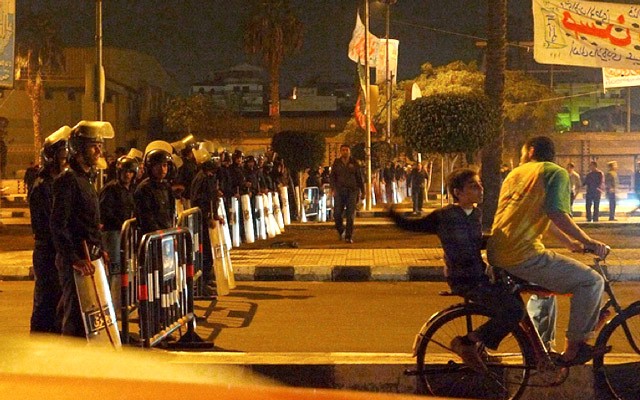Hushed and Growing Dissent in Cairo: "It Is Going to Happen Here"
by Christian Vachon

In Egypt, the most popular topics are also the most discouraged. Yesterday, what is thought to be the ninth person to attempt self-immolation in the last month in Egypt was arrested before he could light himself on fire. These protest-suicides — often attempted suicides; of the five this week, at least two have died — mimic the dramatic suicide in Tunisia of mid-December, which preceded the fall of that country’s government by just a week. This is a thing that, were it occurring in America, would literally obliterate all other news.
I sensed this system of discouragement before I was formally given any rules, riding in the back seat of a taxi from the airport the day I arrived in Cairo. On the highway we passed an empty granite pavilion. “Sadat! Sadat,” the driver yelled to me, pointing out the window. He held up his hand, making a gun. “There, Sadat killed.” Seeing I understood, the driver breathed a prayer and we continued down the road.
I had accepted a position teaching at a private school in Cairo after six years of living in Brooklyn and teaching in Harlem. I am American and had never been to the Middle East, but each year in New York City had become too much like the last and I feared that I might wake one morning to see that 25 years had passed. But I had no clear vision of where to go. I knew only that I had to get as far from the familiar as possible. A Palestinian friend once told me, “The only trace of Arab culture left is in those places where there is no oil beneath the ground.” With this in mind, I moved to Cairo.
Upon arrival, my administrator then did formally brief me on all I would need for a comfortable life. “There are only two rules here,” he said. “Do not talk about politics. Do not talk about religion.”
On occasion, rules are broken. Egyptians are very familiar with 26-year-old blogger Kareem Amer, who was released from prison on November 17th, 2010. In February 2007, the former law student was given a four-year sentence — one year for defamatory statements about President Mubarak and three years for mocking Islam.
Some rules are not. I discovered this after assigning a photography assignment around the question: How is power projected in society?
The assignment died almost as soon as I’d handed it out. Egyptians know that they cannot walk around in public taking photographs. “We have lives and futures ahead of us. I don’t want to begin with a jail stint,” a student said. “You don’t understand. Here they arrest you first, then they ask you questions.”
Egyptian society functions on the careful maintenance of exterior surfaces that are the result of these rules. But this week, in public and in their daily lives, Egyptians have been breaking rules.
The local press made little note of the 100 demonstrators gathered outside the Tunisian embassy in the Zamalak district. They were shouting, “We are next, we are next. Listen to the Tunisians, it’s your turn, Egyptians!” — before security forces were called in to break up protests.
The following afternoon I sat in a taxi through 15 minutes of traffic, attempting to enter Zamalak, the leafy upscale Nile island district that is home to 1.8 million Egyptians. Six police guards carrying machine guns blocked the neighborhood’s access bridge.
Along the side of the street, standing in formation in two single-file rows, twenty men deep, were police in riot gear. They stood silent beside the passing cars, dark visors down, batons dangling from their sides, shields resting at their feet.
At the top of the checkpoint an officer halted the taxi. He looked inside the cab. We made eye contact. I smiled. He grinned and waved us through.
And the next morning in my English class, for the first time all year, my students brought up politics. One student, without irony, explained the reasoning behind his support of Gamal Mubarak, the president’s son and potential successor: “He was born into wealth so he will not need to rob the country any more.”
“Does everyone know what is happening in Tunisia?” a student said. On this note the room fell silent. Half the class nodded. A few others put their heads down. “It is going to happen here,” a girl said.
Last month I was eating sushi in Beirut, discussing Egyptian politics with the restaurant’s 50-something Lebanese owner. In the background was a speech by the head of Hezbollah. The speech had interrupted primetime programming on all major networks. “Elections are coming next year. You are going to have a revolution in that country,” the man said.
“Impossible,” I said. “There will be an election.” This will be Egypt’s second presidential election ever. “Gamal Mubarak will win. Perhaps there will be protests, but the police will restore order and life will continue as it has.”
“You live in a country in which 65 million people are controlled by one million people,” he said. “How long can this go on?”
Gordon Reynolds is the pseudonym of a teacher in Cairo.
Photo from Flickr by Al Jazeera English, from election night, November 28, 2010, when unusual protests took place in Egypt against government corruption.
